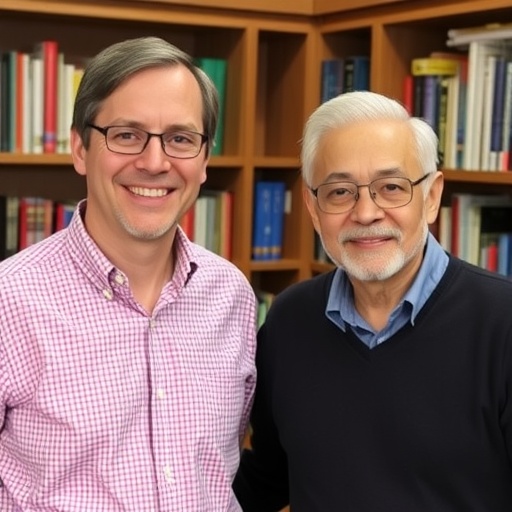David Stern, Ph.D., a pioneering scientist renowned for his groundbreaking work in insect-plant interactions and evolutionary biology, is set to join the prestigious Stowers Institute for Medical Research in Kansas City in February 2026. With a distinguished career spanning over a decade at the Howard Hughes Medical Institute’s Janelia Research Campus, Stern’s move promises to catalyze new directions in the understanding of biological systems that fuse genetics, molecular biology, and ecology.
At the heart of Stern’s research lies a fascinating biological enigma: the mechanisms by which insects manipulate plant development to create specialized structures known as galls. These intricate alterations in plant morphology serve as protective havens for aphids, tiny sap-sucking insects infamous for their agricultural devastation. Stern’s laboratory was instrumental in the discovery of a novel family of proteins, dubbed “bicycle proteins,” which aphids deploy to hijack plant developmental pathways. This revelation provides a molecular framework for a phenomenon observed since antiquity, shedding light on the sophisticated evolutionary arms race between plants and their insect parasites.
The implications of this research are profound. Aphids are vectors carrying various plant pathogens including viruses and bacteria, contributing to massive crop losses worldwide. By elucidating the pivotal role of bicycle proteins secreted from aphid salivary glands, Stern’s findings unearth a potential Achilles’ heel in the lifecycle of these pervasive pests. Targeting the salivary glands could lead to innovative pest management strategies that are both targeted and environmentally sustainable, circumventing the drawbacks of conventional pesticide use.
What makes stern’s discovery of bicycle proteins exceptional is their evolutionary novelty; these proteins lack identifiable homologs in other known organisms. This uniqueness offers an unprecedented platform to explore fundamental biological questions regarding protein evolution, genome manipulation, and the origin of novel molecular functions. Such insights extend far beyond aphid biology, touching upon broader themes in evolutionary developmental biology and molecular innovation.
Stern’s interdisciplinary approach, integrating fieldwork with advanced biochemical and genetic methods, has consistently pushed the boundaries of classical genetics. His ability to weave together evolutionary theory, molecular biology, and ecological context creates a rich tapestry of understanding that has global implications, from food security to evolutionary theory. The Stowers Institute, with its emphasis on investigator-driven research and state-of-the-art facilities, provides an ideal setting for Stern to advance these endeavors.
The institute’s unique funding model, backed by American Century Investments, offers an academic environment free from the typical constraints of grant cycles and financial pressures, empowering researchers like Stern to delve deep into complex scientific questions. Stern acknowledges that the freedom to engage directly in bench science alongside his team is a rare and invaluable asset, fostering an atmosphere of curiosity-driven discovery.
Stern’s move to the Stowers Institute signifies a paradigm shift toward embracing complex biological interactions at molecular and organismal levels. His laboratory aims to further unravel the molecular dialogues between sap-sucking insects and their host plants, with an eye towards translating these insights into novel biotechnological applications. This work promises to enhance sustainable agriculture by designing pest control methods that minimize environmental impact while maintaining crop health.
Moreover, Stern’s research illuminates fundamental aspects of protein function and evolution. Since bicycle proteins do not resemble known protein families, they serve as a natural experiment in molecular innovation, potentially guiding scientists in understanding how new genes arise and acquire specialized functions. This has far-reaching implications for evolutionary genetics and the study of developmental processes.
The discovery of insect-derived molecules that modify plant growth also touches on broader ecological and evolutionary dynamics. It highlights the intricate co-evolution of species and the complex molecular conversations underpinning symbiotic and parasitic relationships. As such, Stern’s work bridges molecular biology with evolutionary ecology, providing a holistic perspective on life sciences.
David Stern’s tenure at the Howard Hughes Medical Institute established him as a leader in integrative science, with extensive expertise spanning genetics, developmental biology, and evolutionary analysis. His reputation as a visionary scientist is further underscored by his innovative use of meta-analysis and interdisciplinary methodologies, aligning perfectly with the Stowers Institute’s mission to tackle foundational questions in biology.
Colleagues at the institute have expressed enthusiasm regarding Stern’s appointment, recognizing how his research agenda aligns with ongoing efforts to decode life’s most enigmatic processes. Alejandro Sánchez Alvarado, President and Chief Scientific Officer of the Stowers Institute, lauded Stern’s approach to science as emblematic of the institute’s core values—bold, inquisitive, and pioneering.
As Stern prepares for his transition, he reflects on the collaborative spirit and intellectual vibrancy that characterize the Stowers community. He emphasizes that the institute’s culture rekindles the excitement of early scientific training, fostering an environment where curiosity leads the way. This supportive framework is poised to facilitate landmark discoveries that will have a lasting impact on biology, agriculture, and beyond.
In summary, David Stern’s recruitment heralds a new chapter for the Stowers Institute, blending evolutionary insight with molecular innovation to unravel the secrets of insect-plant interactions. His work on aphid bicycle proteins opens promising avenues for sustainable pest management and advances fundamental knowledge of protein evolution. With the institute’s unparalleled resources and commitment to investigator-driven science, Stern’s research is well-positioned to transform our understanding of biological complexity and to inspire the next wave of scientific breakthroughs.
Subject of Research: Insect-Plant Interactions, Evolutionary Biology, Molecular Mechanisms of Aphid-induced Plant Galls
Article Title: David Stern to Join Stowers Institute, Unlocking Molecular Secrets of Insect-Plant Co-evolution
News Publication Date: September 30, 2025
Web References:
- https://stowers.org/
- https://www.hhmi.org/scientists/david-l-stern
- https://www.janelia.org/lab/stern-lab
Image Credits: Stowers Institute for Medical Research
Keywords: Plant sciences, Evolutionary biology, Genetics, Molecular biology, Parasitology, Plant microbe interactions, Plant pathology, Scientific workforce, Science careers




